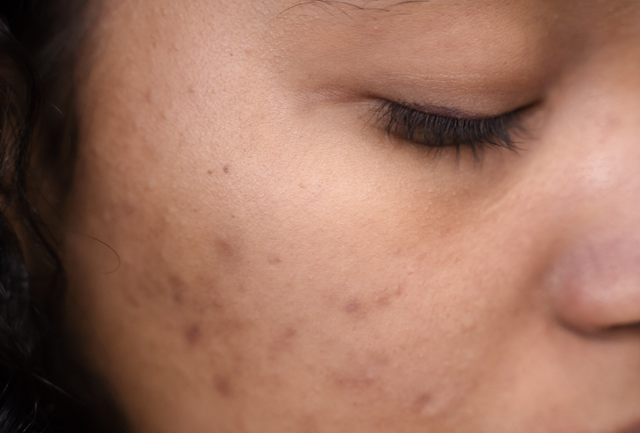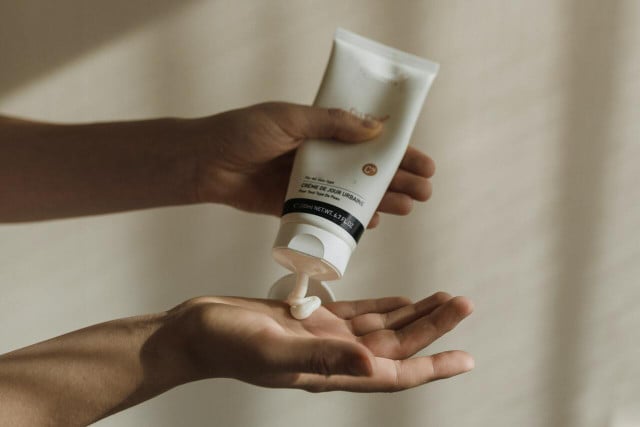A damaged skin barrier may look like acne, but the treatment couldn’t be more different. Learn what a damaged skin barrier is, how to fix it and prevent it.
Your skin provides a protective shield (or skin barrier) against environmental threats while ensuring your skin stays hydrated. However, this crucial protection can be compromised under certain conditions, resulting in a damaged skin barrier.
Recognizing the signs of a damaged skin barrier, differentiating it from acne-prone skin and learning how to repair a damaged skin barrier through appropriate care and preventative measures are key steps in restoring and safeguarding your skin’s innate defense mechanism.
What Is the Skin Barrier?

The skin barrier, often associated with the outermost layer of skin known as the epidermis, functions as a critical protective shield for your body. It effectively safeguards you from harmful elements such as UV radiation and various airborne environmental pollutants, including gaseous compounds, carbon monoxide and heavy metals. As the largest organ of the body, the role of the skin and its barrier is vital.
A damaged skin barrier, however, significantly impairs this protective function, making the skin more susceptible to pollutants and bacteria, akin to how a weakened immune system increases the body’s vulnerability to illnesses. This barrier also crucially maintains hydration levels by balancing water within the skin, combats invasion by microbes and harmful substances, and diminishes the harmful impact of UV light exposure and oxidative stress.
Damaged Skin Barrier: Symptoms and Causes
A damaged skin barrier often reveals itself through a range of symptoms, including redness, inflammation, skin tightness, dryness, heightened sensitivity and overall compromised skin texture. If you notice these signs, it’s important to address them quickly to avert further harm. You may find your skin feels itchy, dry and seems unable to hold onto moisture effectively.
Usually, damage to your skin barrier results from a mix of intrinsic and extrinsic factors. Intrinsic factors can include genetic conditions such as eczema or high-stress levels, while extrinsic factors typically relate to inadequate skin protection and can result from overexposure to stress or too many active ingredients. Changing weather conditions and highly polluted environments can also notably increase your skin’s vulnerability to damage.
Overuse of active ingredients, such as chemical exfoliants like AHA (alpha hydroxy acids) and retinoids, is one of the most common causes of a damaged skin barrier. These ingredients work by continuously shedding the upper layer of your skin to promote faster skin renewal, but their potency can be overly harsh and cause skin irritation. Similarly, washing your face with hot water can further exacerbate a damaged skin barrier.
Recommended reading: Dry Skin Remedies: 9 Ways to Soothe Dry Skin Naturally
Differentiating a Damaged Skin Barrier from Acne



While a damaged skin barrier can mimic acne due to the presence of bumps, these two skin conditions are unrelated. Acne is generally marked by clogged pores, potentially resulting from comedogenic ingredients and excessive sebum production — both of which are intrinsic factors.
Meanwhile, a damaged skin barrier is predominantly attributed to extrinsic factors such as over-exfoliation or the use of harsh skin care products. One crucial difference is that your skin might feel itchy when your skin barrier is damaged, which would not typically occur with acne.
The differences extend beyond causation into the realm of treatment. Skin care routines for acne and a damaged skin barrier vary substantially. Using chemical exfoliants like beta hydroxy acids (BHA) or retinoids can be highly beneficial for acne-prone skin as they help unclog pores and regulate sebum production. However, these products can severely worsen a damaged skin barrier. Instead, a damaged skin barrier requires a repair-focused approach, using products that are hydrating, soothing and healing.
Skin Care Routine to Soothe a Damaged Skin Barrier
https://vm.tiktok.com/ZGJx2LC1k/
To soothe a damaged skin barrier, it is essential to adopt a gentle skin care routine that focuses on replenishing and repairing the protective barrier. Completely cut out harsh ingredients like BHA or retinoids until your skin barrier is no longer irritated. Instead, focus on hydrating products like hyaluronic acids, peptides and especially ceramides.
Here’s a suggested morning and night skin care routine to alleviate symptoms:
Morning:
- Cleanse: Use a mild, non-foaming cleanser to avoid stripping the skin’s natural oils. Our DIY Face Wash is perfect for this step. If your skin is not too oily, you might even get away without washing your face or simply using water without any cleanser.
- Hydrate: Apply a hydrating toner or essence to replenish moisture and support the skin barrier.
- Moisturize: Choose a moisturizer rich in emollients and humectants to lock in moisture and provide nourishment. Bonus points for all moisturizers containing ceramides.
- Protect: It is absolutely crucial to apply a broad-spectrum sunscreen with SPF 50 to shield your skin from UV damage.
Nighttime:
- Cleanse: Double cleanse with an oil-based cleanser followed by a mild water-based cleanser to remove impurities without causing further damage.
- Hydrate: Apply a hydrating serum or ampoule to provide an extra boost of moisture. Serums containing niacinamides or peptides are great, too.
- Repair: Opt for moisturizers and creams containing ceramides, which restore skin barrier integrity. You can also create your own homemade face cream if you prefer to hydrate your skin naturally.
- Avoid Harsh Products: Steer clear of abrasive scrubs, alcohol-based toners, and strong acids that may further damage the skin barrier.
Foods for Skin Health



Maintaining a balanced diet can also help maintain to a healthy skin barrier. Incorporate foods rich in beta carotene and essential fatty acids, such as avocados, carrots, sweet potatoes, nuts and seeds. These ingredients support ceramide production, an integral element of the skin barrier.
In addition, consuming antioxidant-rich foods like berries, leafy greens and green tea can protect the skin from oxidative stress.
How to Prevent a Damaged Skin Barrier



Maintaining the health of your skin barrier is pivotal to overall skin health. Here are some crucial tips to prevent future damage:
- Practice Gentleness: Opt for gentle cleansers and cooler water to avoid stripping away your skin’s natural oils and disrupting the skin barrier.
- Hydrate Internally: Ensure you drink enough water daily to hydrate your skin from the inside.
- Apply Suitable Moisturizers: Use a moisturizer that matches your skin type, paying particular attention to those containing ceramides.
- Protect Your Skin: Defend your skin against extreme temperatures, pollution and UV radiation with suitable clothing, shade and sunscreen.
- Remain Consistent: Stick to your skin care routine and have patience when trying new products — wait at least six weeks to evaluate results. Refrain from frequently changing your routine.
- Simplify Your Routine: Keep your skin care routine straightforward. Avoid adding new products too often and minimize your use of masks or special treatments.
- Trust Your Intuition: Listen to your own skin concerns over viral beauty trends.
Key Takeaways
Your skin barrier is vital in maintaining overall skin health and protecting it from external stressors. You can restore and safeguard your skin’s protective shield by recognizing the signs of a damaged skin barrier, adopting a gentle skin care routine, and incorporating ingredients like ceramides. Prioritizing proper care and prevention methods will help you maintain a resilient and healthy skin barrier and glowing complexion.
We’re all eager to try out new skin care and beauty trends we might see on social media but remember: everybody’s skin is different. First and foremost, you should watch your skin’s concerns and be mindful of not overdoing it. Keep your routine as simple as possible, and prioritize soothing products over aggressive ones.
Patch testing is crucial when incorporating a new active product into your routine. Additionally, limit its use to once every few days for a minimum of six weeks. Skin cycling can be an effective strategy if you’re keen on using active ingredients while bolstering your skin barrier health. Moreover, introduce only one new skin care product to your routine at a time. This approach prevents overwhelming skin and allows you to accurately identify any products that might irritate your skin.
Read more:
- Acid Mantle on Your Skin: Significance and How to Protect It
- 10 Best Ingredient Checkers for Skin Care and Household Products
- How to Naturally Fix Chapped Lips Fast
- Does Mewing Work? Inside the Jaw Defining Craze
Important Information regarding Health-related Topics.
** Links to retailers marked with ** or underlined orange are partially partner links: If you buy here, you actively support Utopia.org, because we will receive a small part of the sales proceeds. More info.Do you like this post?











